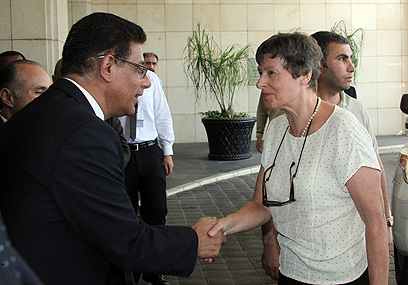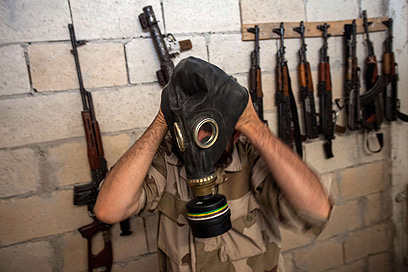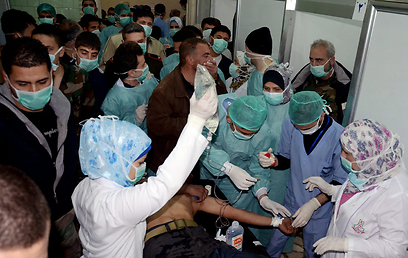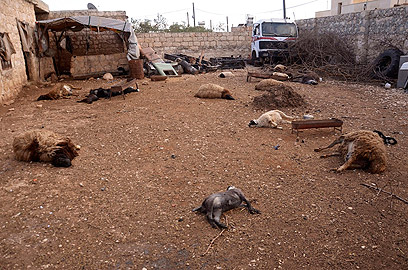A senior United Nations team tasked with investigating the alleged use of chemical weapons in Syria's civil war arrived in Damascus Wednesday to discuss with government officials a possible inquiry into such attacks.
This is the first such trip by international experts and the talks are expected to be thorny – focusing on about a dozen incidents in which chemical arms were allegedly used. The rebels, the US and others have accused the regime of using the weapons of mass destruction, while Damascus and its ally Russia have blamed the rebels for such attacks.
Related stories:
- UN rights team believes chemical weapons used in Syria
- Jordanian troops prepare for chemical attack
- Rebels: Assad, Hezbollah used chemical weapons
The team has been invited by the Syrian government to discuss the terms of a possible probe.

UN disarmament chief Angela Kane (Photo: EPA)
Damascus has requested the UN investigate only one of the reported attacks – a March 19 incident in the northern village of Khan al-Assal in which both rebels and the government accuse each other of using chemicals weapons – but refused inquiries into other alleged attack sites in the central city of Homs, Damascus and elsewhere.

Rebel trying on gas mask (Photo: AFP)
The US and UN officials have called on Assad's regime to grant the United Nations team unfettered access to investigate all allegations of possible chemical weapon use.
Video courtesy of jn1.tv
Swedish chemical weapons expert Ake Sellstrom and UN disarmament chief Angela Kane arrived from neighboring Lebanon for a two day visit, during which they are to meet with senior Syrian officials, the UN said in a brief statement issued in the Syrian capital.
The Assad regime is said to have one of the world's largest stockpiles of chemical weapons, including the mustard gas and the nerve agent sarin.

Alleged victims of chemical attack (Photo: AP)
There are concerns that Assad might use them on a large scale, transfer some of them to the Lebanese militant Hezbollah group or that the chemical agents could fall into the hands of al-Qaeda militants and other extremists among the rebels.
Khan al-Assal, which lies on the southwestern edge of the embattled city of Aleppo, was under government control in March but was captured by the rebels earlier this week. Even if the UN team is granted access to Khan al-Assal from both sides, it may be difficult to find evidence from the attack because so much time has passed.

Khan al-Assal: Livestock died as result of chems (Photo: Reuters)
In June, the United States said it had conclusive evidence that President Bashar Assad's regime used chemical weapons against opposition forces. That crossed what President Barack Obama called a "red line," prompting a US decision to begin arming rebel groups, although that has not happened yet.
On Tuesday, UN Mideast envoy Robert Serry told the Security Council that the UN has received 13 reports of alleged chemical weapons use in Syria. He said Sellstrom's team is studying this and other material.
"There is a growing body of limited but persuasive information showing that the regime has used and continues to use chemical weapons, including sarin," said British UN Ambassador Mark Lyall Grant.
Russia, Syria's close ally, has called the chemical weapons allegations against Assad's regime groundless, claiming Russian experts determined that Syrian rebels made sarin nerve gas and used it in the Khan al-Assal attack, in which 31 people died.
More than 93,000 people have been killed since the Syrian conflict started in March 2011, according to UN estimates.
- Receive Ynetnews updates
directly to your desktop















